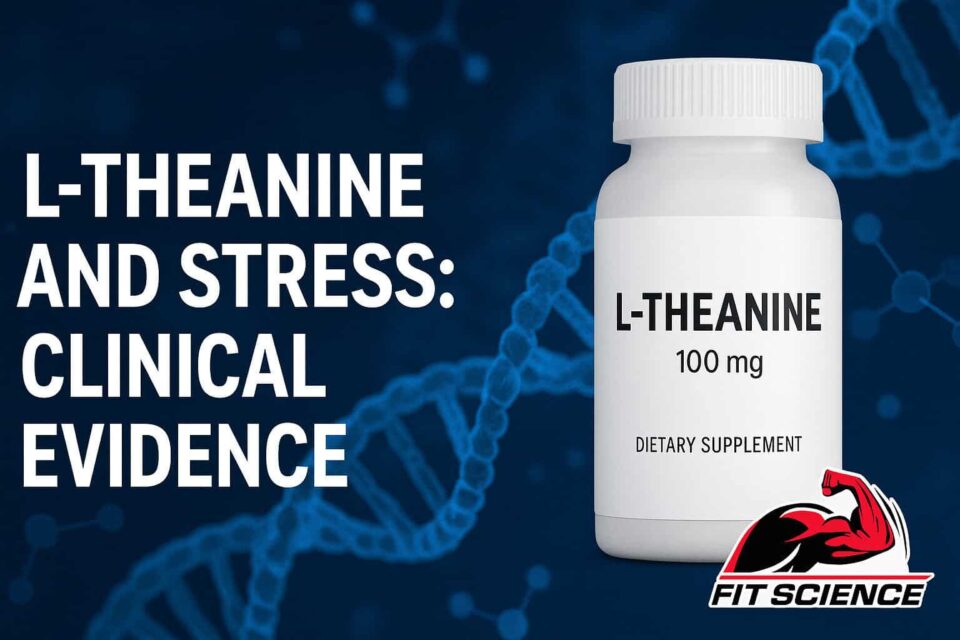L-theanine is a non-protein amino acid naturally found in tea (especially green tea). It readily crosses the blood–brain barrier and appears to modulate glutamatergic signaling while nudging GABA/serotonin/dopamine in directions consistent with “calm focus.” In humans, a consistent early signal is an increase in alpha-band brain activity—an EEG signature associated with relaxed alertness—around 30–60 minutes after ingestion. Those neurophysiology patterns matter here because trials that measured alpha waves alongside stress biomarkers often moved in the same (calming) direction.
What the best human trials say about cortisol and stress
1) Single-dose, stress-challenge RCT (triple-blind crossover)
A 2021 trial gave 200 mg L-theanine (AlphaWave®) or placebo to healthy adults and then exposed them to a mental-arithmetic stressor. Compared with placebo, L-theanine produced:
-
Greater increases in frontal and whole-scalp alpha power.
-
A significantly larger drop in salivary cortisol 1 h post-dose and after the stress task.
-
Lower state anxiety ratings.
Takeaway: A single 200 mg dose can modestly attenuate the salivary cortisol response and shift brain activity toward relaxed alertness within a few hours.
2) L-theanine nutrient drink under a cognitive stressor
In a double-blind, placebo-controlled crossover study, adults consumed an L-theanine–based drink and performed a multitask stress battery.
-
Subjective stress dropped one hour after active treatment vs placebo.
-
Salivary cortisol response to the stressor was reduced three hours post-dose.
Takeaway: Again, we see anti-stress and anti-cortisol effects on a short time scale (1–3 h).
3) Four-week, placebo-controlled, double-blind crossover (200 mg/day)
A 2019 trial gave participants 200 mg/day for 4 weeks. The L-theanine phase improved trait anxiety, depressive symptoms, and sleep quality versus placebo. Cortisol wasn’t the main endpoint, but the symptom improvements align with a calmer stress profile.
4) Autonomic stress physiology: blood pressure, heart rate, and s-IgA
A 2012 trial found 200 mg L-theanine blunted blood-pressure spikes in stress-sensitive individuals and reduced tension–anxiety scores.
Another trial showed reduced heart rate and salivary IgA responses during stress.
Takeaway: Even when cortisol wasn’t measured, the autonomic stress response was consistently softened.
5) Systematic reviews and overall conclusions
Recent reviews conclude that L-theanine can reduce stress/anxiety and improve sleep. Acute trials often pair alpha-wave increases with lower cortisol during stress challenges. But reviewers note the need for larger, longer RCTs to confirm effects and measure chronic basal cortisol.
Mechanisms that plausibly link L-theanine to lower cortisol
-
Glutamatergic modulation: Theanine antagonizes excitatory glutamate signaling, reducing HPA-axis drive.
-
Alpha-band enhancement: EEG alpha increases correlate with cortisol reductions.
-
Autonomic rebalancing: Lower HR and BP responses suggest less sympathetic activation, which links to reduced cortisol output.
How strong is the anti-cortisol claim?
-
Supported for acute stress: At least two strong RCTs show lower salivary cortisol after L-theanine vs placebo during stress challenges.
-
Less clear for chronic use: Few studies measure basal cortisol after weeks of supplementation.
-
Effect sizes are modest but meaningful.
Dosing, timing, and expectations
-
Acute stress: 200 mg taken 30–60 min before stress exposure shows the strongest cortisol-lowering evidence.
-
Daily use: 200 mg/day for 4 weeks improves anxiety and sleep.
-
Pairing with caffeine: For focus, yes. For stress relief, use L-theanine alone.
Safety and limits
Generally well tolerated, with human data supporting daily doses of up to ~1,200 mg/day. Typical supplemental range: 100–250 mg/day. Those on medications, pregnant, or breastfeeding should consult a clinician.
Practical uses
-
Performance anxiety: 200 mg before a big event or presentation.
-
Work stress: 100–200 mg late morning/afternoon.
-
Sleep-related stress: 100–200 mg 1–2 h before bed.
Where research still needs to improve
-
Longer studies tracking diurnal cortisol rhythm.
-
Standardized dosing and product comparison.
-
More data in high-stress clinical populations.
Bottom line
-
L-theanine can blunt cortisol spikes to acute stressors and promote a relaxed but alert state.
-
Weekly use improves subjective stress and sleep, but more data are needed on chronic cortisol effects.
-
Best-supported use: 200 mg before predictable stress, or 200 mg/day for weeks to reduce ongoing anxiety and improve sleep quality.
References
-
White, D. J., et al. (2021). Acute effects of L-theanine on stress-related responses and cognitive performance. PubMed
-
Owen, G. N., et al. (2008). The combined effects of L-theanine and caffeine on cognitive performance and mood. ScienceDirect
-
Hidese, S., et al. (2019). Effects of L-theanine on stress-related symptoms and cognitive functions in healthy adults: a randomized controlled trial. PubMed
-
Yoto, A., et al. (2012). Effects of L-theanine on attention and reaction time response. ScienceDirect
-
Nobre, A. C., Rao, A., Owen, G. N. (2008). L-theanine, a natural constituent in tea, and its effect on mental state. PubMed
-
Lopes Sakamoto, F., et al. (2019). Effects of L-theanine on stress and anxiety: a systematic review. PubMed




